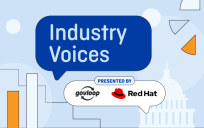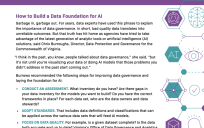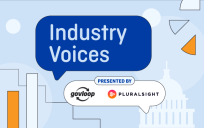This is the third blog in a four-part series detailing the components necessary for AI success. You can read my earlier posts about cultural willingness, and data and infrastructure readiness to get caught up. Look for the final post in this series coming soon, covering ethics, risk and compliance planning.
Organizations face a daunting task in today’s digital era: to identify, organize and analyze the hordes of data that continue to grow in complexity, scope, and size. While Artificial Intelligence (AI) can automate basic tasks, there still remains the challenge of freeing employees up for analytical and creative thinking, to develop the skills needed to successfully implement AI, and to benefit from its power.
AI talent, as we all know, is an extremely scarce resource. The talent shortage is so severe, in fact, that left unaddressed it may limit the implementation rate of AI technologies. I’m not talking about attracting data scientists and PhDs—the battle in that arena is already on—but rather developing the technical and nontechnical skills across the organization that are needed to work alongside AI. Where can this talent be found? The answer is right in front of us: within our existing workforce. The key to tapping into this existing resource pool is reskilling.
To facilitate the giant shift in mindset and skills required for AI readiness, organizations must invest in AI curriculum. Upskilling your existing workforce by developing in-house training programs, and through online training sites such as General Assembly, NVIDIA, Coursera or Kaggle, etc. is a start. Making it fun, with hack-a-thons, contests and game-based training can go a long way too. But true reskilling for AI goes deeper, requiring a shift in mindset.
At a Changeboard Future Talent event in London during March 2019, thought leaders discussed the need for a more radical approach to reskilling that develops behaviors and attitudes along with technical skills. In the past, talent was evaluated in terms of IQ (Intelligence Quotient). When IQ was found to be a poor predictor of on-the-job performance, employers added EQ (Emotional Quotient) to the mix, seeking soft skills like communication and initiative in addition to knowledge. The developing era of AI, however, requires a third factor, LQ (Learning Quotient, or Learnability Quotient), and the corresponding ability to continuously learn new skills. The LQ factor has a growth mindset. Someone with high LQ is willing to learn from their mistakes to improve performance.
An aptitude for learning might precisely be the ability to learn from mistakes. As one wise person once said, “good judgment comes from experience, and experience comes from bad judgment.”Not too surprisingly, that way of thinking is directly applicable to the scientific method (hypothesis testing, error estimation, and hypothesis refinement), to machine learning algorithms (which “learn from experience”), to agile methodologies (fast fast to learn fast), to innovation, and to raising teenagers. Finding employees with high IQ is good. Finding employees with high EQ is better. Finding employees with high LQ might be best of all.
Talent reskilling isn’t limited to employees—it extends to leaders as well. Early adopters of AI have highlighted the need for leadership to have foundational knowledge of AI so that they can be realistic about expectations, can identify the right projects for AI, and can encourage trial-and-error (DevOps or AIops) development strategies. Tomorrow’s AI leaders must be equipped to supervise data scientists and to incorporate AI into day-to-day operations.
There is no checklist that can predict AI success based on talent, but there is one to help organizations think through the steps needed to develop and reskill their workforce. This is it:
Does your organization have…
- A clear understanding of the talent (skills and competencies) needed to achieve AI goals?
- People with the skillsets to fill these AI talent profiles?
- People with the mindset (high LQ) to learn new skills?
- A comprehensive recruiting, hiring and retention strategy (perhaps with greatest emphasis on retention)?
- A training program to build specific AI and analytic skills?
- Opportunities for learning and development to help retain existing talent?
- A recognized leader/change agent for AI?
- Staff and senior leaders who have a foundational understanding of AI?
- Staff and senior leaders who consistently use analytic insights to drive their decisions?
- A collaborative culture that encourages data and analytics sharing?
- A culture of experimentation that accepts agile “fast fast to learn fast” learning experiences?
Organizations who have experienced AI success see the need for continuing talent development. In fact, I would say that rather than thinking of reskilling and development as one-and-done tasks, organizations need to view it as an ongoing process that will feed AI maturity, fuel larger goals and drive more significant implementations. To that end…
I am frequently asked for suggestions regarding academic institutions, professional organizations, free online courses, or materials that provide data science training. You can start with The Booz Allen Field Guide to Data Science and then explore my larger list of training opportunities. These resources contribute significantly and fundamentally to workforce upskilling for AI readiness.
Dr. Kirk Borne is a GovLoop Featured Contributor. He is the Principal Data Scientist and an Executive Advisor at management consulting firm Booz Allen Hamilton since 2015. In those roles, he focuses on applications of data science, data management, machine learning, and AI across a variety of disciplines. You can read his posts here.





I really like the mini checklist. As you stated there is no checklist that can predict AI success based on talent but this is a great start for agencies or companies to start thinking about this.